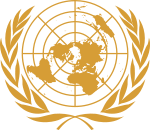Chapter XII of the United Nations Charter
- Chapter XII of the United Nations Charter
-
Chapter XII of the United Nations Charter deals with the international trusteeship system. It reaffirms the twin goals mentioned in Chapter XI to "promote the political, economic, social, and educational advancement of the inhabitants of the trust territories, and their progressive development towards self-government or independence". It also provides that the trusteeship system applies to:
- territories now held under mandate;
- territories which may be detached from enemy states as a result of the Second World War; and
- territories voluntarily placed under the system by states responsible for their administration.
Although there are no territories administered under this system today, a country could theoretically place one of its territories under the trusteeship system. Articles 82-85 make reference to "strategic areas" of territories.
References
Wikimedia Foundation.
2010.
Look at other dictionaries:
Chapter VII of the United Nations Charter — sets out the UN Security Council s powers to maintain peace. It allows the Council to determine the existence of any threat to the peace, breach of the peace, or act of aggression and to take military and nonmilitary action to restore… … Wikipedia
Chapter I of the United Nations Charter — lays out the purposes and principles of the United Nations organization. These principles include the equality and self determination of nations and the obligation of member countries to obey the Charter, to cooperate with the UN Security Council … Wikipedia
Chapter IV of the United Nations Charter — contains the Charter s provisions dealing with the UN General Assembly, specifically its composition, functions, powers, voting, and procedures. Contents 1 Primacy of the General Assembly 2 Articles 10, 11, 12, 13, 14, 15, and 16 3 Article 17 … Wikipedia
Chapter VI of the United Nations Charter — deals with peaceful settlement of disputes. It requires countries with disputes that could lead to war to first of all try to seek solutions through peaceful methods such as negotiation, enquiry, mediation, conciliation, arbitration, judicial… … Wikipedia
Chapter II of the United Nations Charter — deals with membership of the United Nations organization. Membership is open to the original signatories and all other peace loving states which accept the obligations contained in the present Charter and, in the judgment of the Organization, are … Wikipedia
Chapter III of the United Nations Charter — summarizes the principal organs of the United Nations. They are listed in the same order as the chapters detailing their composition, functions, and powers appear in the Charter. The placement of the General Assembly first in the list probably is … Wikipedia
Chapter IX of the United Nations Charter — deals with international economic and social cooperation. Article 55 reflects the philosophy of the UN that efforts should be made to impact the root causes of war: With a view to the creation of conditions of stability and well being which are… … Wikipedia
Chapter XVI of the United Nations Charter — contains miscellaneous provisions prohibiting secret treaties, establishing the UN Charter as supreme over any other treaties, and providing for privileges and immunities of UN officials and representatives. Contents 1 Article 102 2 Article 103 3 … Wikipedia
Chapter V of the United Nations Charter — contains provisions establishing the United Nations Security Council. Article 23 establishes the composition of the Security Council, with five permanent members (the Republic of China, France, the Soviet Union, the United Kingdom, and the United … Wikipedia
Chapter VIII of the United Nations Charter — deals with regional arrangements. It authorizes regional organizations (such as NATO) and even requires attempts to resolve disputes through such agencies (if available) prior to intervention by the UN Security Council. However, Article 53… … Wikipedia

